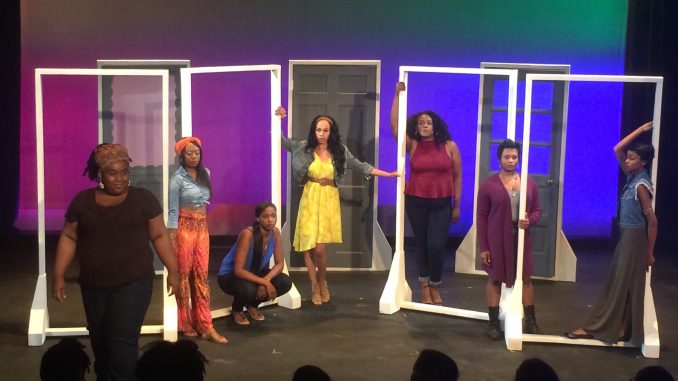
Sabriaya Shipley first read the play “for colored girls who have considered suicide/when the rainbow is enuf” when she was 13 years old. Now she plays one of the seven protagonists for Temple Theaters’ version of the production.
“I fell in love with it,” said Shipley, a sophomore theater major. “I felt that it spoke to what I was going through as a young black girl.”
Temple Theaters presents five plays every year, and the Obie Award-winning play “for colored girls” by Ntozake Shange, is the opening production of the season. Directed by Lee Kenneth Richardson, an associate professor of acting and directing, the show will play through Sept. 24 in the Randall Theater at various times.
The play, celebrating its 40th anniversary this year, presents seven nameless women of color and their daily struggles within society.
“It’s a wonderful opportunity to see black women be vulnerable, be themselves and also just be within the world,” Shipley said.
Coincidentally, the play is being presented in a time when movements for racial equality have occurred nationally, which is why Imani Rothwell, a sophomore theater major, wanted to participate.
“I wanted to be in this play especially because it’s important during this time where black girls are often silenced, and I felt this was a way I can use my art and the platform of art to voice black girls and the things we go through,” Rothwell said.
It took three-and-a-half weeks to prepare for this production and part of the training involved discussions on the life of a black woman today.
“It was very fun to come in and to have a role where I can unleash that tension that comes when you’re not allowed to discuss certain topics in academic fields,” Shipley said. “Here in this rehearsal we could do that, especially because as black women, we deal with intersectionality a lot—we deal with racism, sexism and class-ism all at the same time.”
Rothwell feels that many theater students of color struggle to have their voices heard in a white-dominated department. According to forbes.com, roughly 59 percent of the undergraduate population at Temple is white, while around 13 percent is black.
“This play put black women faces on stage—it will challenge what is going on within Temple in itself with black theater students and what we go through,” she said. “This play is going to show Temple that we need more of us on stage. Diversity is not having a play where there’s only two black people casted.”
Another actress in the play, Victoria Goins, a junior strategic communications major, believes Temple as a university could do much better in terms of promoting its diverse student body.
“One of the most disappointing things that I felt when I got to Temple, just in general, was that they promote diversity so much, they call themselves the ‘Diversity University,’ but I don’t think you should call yourself that if there’s no integration,” Goins said.
Richardson said that this play, among others, can help to bring change.
“I believe strongly that theater should always be a platform for social justice,” he said.
Rose Daraz can be reached at rose.daraz@temple.edu.


Be the first to comment